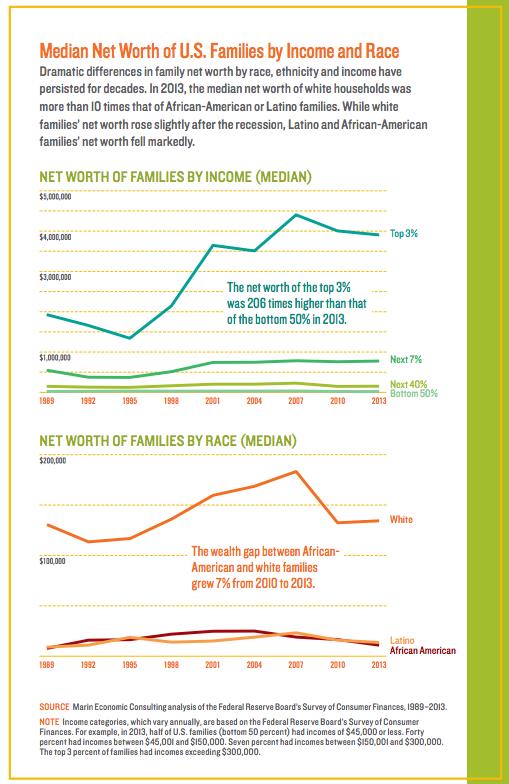February 2016 U.S. Poverty Action
Educate Yourself about Race, Poverty, and Inequality in America
 As we continue to advocate for policies that promote economic mobility and address the growing wealth gap, in particular the racial wealth gap, this month we are focusing on educating ourselves deeper about racial injustice in America. The book Between the World and Me by Ta-Nehisi Coates is a deeply personal account of one African-American man’s experience of being black in America. While not everyone will agree with his insights, his views prompt some important questions that all Americans should ponder and discuss about our racist past and how to move forward from here.
As we continue to advocate for policies that promote economic mobility and address the growing wealth gap, in particular the racial wealth gap, this month we are focusing on educating ourselves deeper about racial injustice in America. The book Between the World and Me by Ta-Nehisi Coates is a deeply personal account of one African-American man’s experience of being black in America. While not everyone will agree with his insights, his views prompt some important questions that all Americans should ponder and discuss about our racist past and how to move forward from here.
Read Between the World and Me this month and discuss your impressions in your local RESULTS group. Below are some questions to get the conversation started.
The Racial Wealth Gap Today
The wealth gap between rich and poor in America is growing dangerously large and nowhere is it more stark than for communities of color. The Annie E. Casey Foundation’s Investing in Tomorrow: Helping Families Build Savings and Assets, shows that median net worth of white households was more than 10 times greater than that of African-American or Latino families in 2013. While white families’ net worth rose by 2 percent from 2010 to 2013, Latino and African-American families’ net worth fell by 15 percent and 34 percent, respectively.
This gap has its roots in historical and modern government polices – including racial discrimination in housing, lending, land-ownership, and education-related government programs. Educating ourselves about these injustices is the first step in taking action to remedy them.
Between the World and Me: Discussion Guide
As you meet with your groups this month to discuss Between the World and Me, here are some questions you can use to get the discussion started:
- What is your personal experience of race relations in America?*
- What are the different aspects of the American Dream, or “the Dream” as Coates calls it, that are discussed in this literature? How are they problematic?*
- Ta-Nehisi Coates, in an interview discussing this novel said, “There’s a difference between 'not knowing' and 'don’t want to know.’” In your reaction to this novel, do you feel that you’ve discovered something new? Do you feel any resistance towards this knowledge?*
- How do you ‘identify’ yourself? Do you use your race as an identifier? In what other ways do you describe yourself and your place in this country?*
- Throughout the reading, there is a very clear theme of disembodiment as he discusses the “system that makes your body breakable” (p. 18). What does this mean for the black community as a whole? When he references bodies being broken, is he really referencing the souls and spirits of the black community being crushed by the American social structure?*
- What does Coates want us to learn from this text? What should be our primary take- away?
- If you could propose solutions to structural racism, where would you start?
- If you were lobbying a member of Congress about the racial wealth gap in America, how would you use what you learned from Between the World and Me to lobby for change? What things would you share from the book?
*Question provided by the University of Central Florida, School of Public Health and Public Affairs
Suggested Reading, Audio, and Video resources:
- The Case for Reparations, Ta-Nehisi Coates (article)
- How Race is Conjured, Barbara J. Fields and Karen E. Fields (article)
- The Fire Next Time, James Baldwin
- The New Jim Crow: Mass Incarceration in the Age of Colorblindness, Michelle Alexander
- The Half Has Never Been Told: Slavery and the Making of American Capitalism, Ed Baptist
- Ta-Nehisi Coates on Theft, Atheism, and History NY Public Library Podcast #83 (audio)
RESULTS will also host an online “Virtual Book Club” discussion of Between the World and Me on February 18 at 1:00pm and 8:00pm ET. To join the conversation, login at: http://fuze.me/27491886; or dial in by phone at (201) 479-4595 and enter Meeting ID: 27491886#.
You can also learn more about the racial wealth gap on our February 13 U.S. Poverty National Webinar. To participate, login at http://fuze.me/28130766 or join via phone by calling (201) 479-4595, meeting ID: 28130766#.